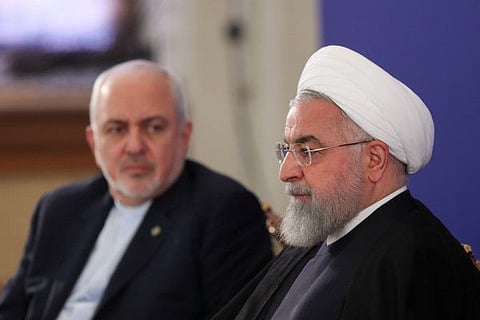France denies Macron invited Rouhani to G7 summit
Rouhani said that Iran ready for worst in uphill struggle to salvage its nuclear deal

Paris: French President Emmanuel Macron has not invited Iranian President Hassan Rouhani to the G7 summit to be held in Biarritz later this month, a French diplomatic source said on Wednesday.
The official was responding to a report on the Al-Monitor website that Macron had invited Rouhani to the G7 meeting in Biarritz at the end of August to meet U.S. President Donald Trump. Rouhani rejected the proposal, according to the report.
Rouhani said last week that Iran was ready for the worst in an uphill struggle to salvage its nuclear deal struck with world powers such as France but which has been abandoned by the United States.
Iran told European powers on Monday it would further reduce compliance with its 2015 nuclear deal in about a month’s time if they were still failing to protect it from crippling U.S. sanctions, reimposed after Washington exited the deal.
European signatories to the deal have so far been helpless to prevent U.S. President Donald Trump trying to force Iran to accept stricter limits to its nuclear activity and regional behaviour by strangling its vital oil trade.
Iran has threatened to block all energy exports out of the Strait of Hormuz, through which a fifth of global oil traffic passes, if it is unable to sell oil as promised by the 2015 deal in exchange for curbing its uranium enrichment programme.
Fears of a Middle East war with global repercussions have risen since Trump withdrew in May 2018 from the nuclear deal embraced by predecessor Barack Obama and revived a panoply of sanctions meant to force Tehran into wider security concessions.
Oil tanker traffic through the Strait of Hormuz has become the focus for the increasingly tense U.S.-Iranian standoff and the Trump administration has beefed up its military presence in the Gulf since May.
On Monday, Iran declared that it ran security in the strait and would no longer tolerate “maritime offences” there, a day after the Islamic Republic said it had seized a second oil tanker near the strategic waterway that it accused of smuggling fuel.
On Sunday, Iran’s elite Revolutionary Guards Corps diverted the Iraqi tanker to its shores and detained its seven crew, state media reported. Guards commander Ramezan Zirahi was quoted as saying it was carrying 700,000 litres of fuel.
“Iran used to forgo some maritime offences in ... (the) Gulf but will never close (its) eyes anymore,” Foreign Minister Mohammad Javad Zarif told a televised news conference in Tehran.
“Iran is responsible for the security and safety of the Strait of Hormuz and the region.” Zarif also criticised U.S. sanctions imposed on him on Wednesday, saying Washington had slammed the door to any diplomacy to salvage the 2015 nuclear deal.
Strains between Washington and Tehran have sharpened since the spring. In June, Iran’s downing of a U.S. surveillance drone triggered preparations for a U.S. retaliatory air strike that Trump called off at the last minute.
“Iran will leave its nuclear deal with the powers if necessary,” Zarif said. Iran has so far rejected calls by the Trump administration to negotiate a new deal.
He also labelled as “piracy” the seizure by Britain in July of an Iranian oil tanker near Gibraltar, that London accused of violating European Union sanctions on Iran ally Syria.
Two weeks later, Iran’s Revolutionary Guards seized a British tanker, Stena Impero, near the Strait of Hormuz for alleged marine violations.
“Britain has been complicit in the U.S. economic terrorism against Iran,” Zarif said.



